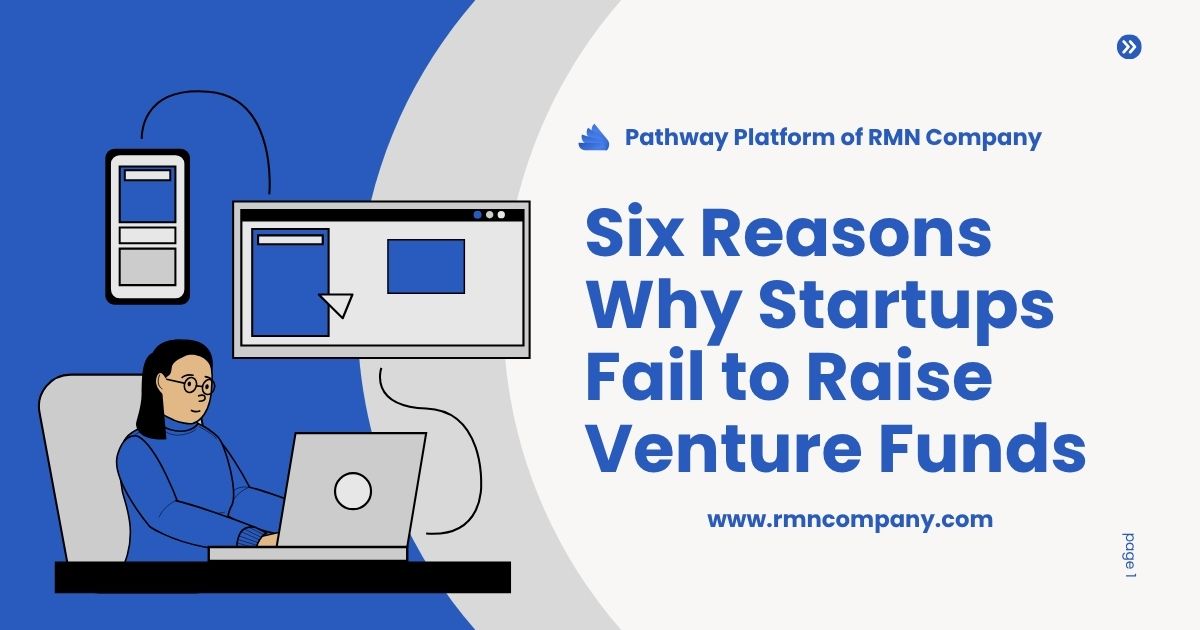
Six Reasons Why Startups Fail to Raise Venture Funds
Explore the Promote with Pathway initiative — a powerful, affordable way for startups and small businesses to gain media presence and connect with potential investors and partners.
By RMN Company | Pathway Technology and Marketing Platform
For many entrepreneurs, raising venture capital (VC) is seen as a hallmark of startup success. Yet the stark reality is this: most startups never raise a single rupee or dollar in venture funding. In fact, only around 0.5% to 1% of all startups globally succeed in securing VC investment.
Why do so many fail in this fundraising race? Based on data, investor feedback, and startup case studies, here are six major reasons why startups struggle — and often fail — to raise venture capital.
🔹 1. Lack of Scalability or High-Growth Potential
Venture capitalists don’t just fund good businesses — they fund businesses that can scale rapidly and generate massive returns, typically 10x to 100x on their investment.
Startups that operate in niche markets, depend heavily on manual processes, or cannot show exponential growth are usually filtered out.
📉 Reality check: If your business can’t show potential to reach ₹100 crore or $10 million+ revenue within a few years, VCs may lose interest.
🔹 2. Insufficient Market Size
VCs want to invest in startups addressing large addressable markets — usually worth billions of dollars or thousands of crores. A brilliant product in a small market is still a small opportunity for investors.
📊 According to Crunchbase and PitchBook, over 60% of rejected startup pitches fail the market size test.
🔹 3. Weak or Incomplete Founding Team
Investors bet on teams, not just ideas. Startups with solo founders, inexperienced leaders, or no clear technical/product ownership are seen as risky.
VCs prefer complementary founding teams with a proven track record, resilience, and the ability to pivot when needed.
🧑💼 Having a great idea without a strong team is one of the top reasons startups get passed over.
🔹 4. Unproven Business Model or Lack of Traction
A working prototype is not enough. Most VCs want to see evidence of traction — user growth, early revenue, customer engagement, or partnerships — that validate product-market fit.
🚫 “We’re still building” is a common pitch killer. Investors want signs that customers want what you’re selling.
🔹 5. Poor Pitching and Storytelling
Even promising startups fail to impress due to unclear, jargon-filled, or overly technical presentations.
VCs expect clear articulation of the problem, solution, value proposition, market opportunity, and monetization strategy — all in just a few minutes.
🎯 A great story, well told, can sometimes win over a skeptical investor. A bad one will always fail.
🔹 6. Wrong Targeting or Lack of Investor Fit
Many founders pitch to the wrong investors — ones who don’t invest in their industry, geography, or stage. Others use generic pitch decks that show no understanding of the VC’s portfolio or investment thesis.
🧭 Success in fundraising requires research, customization, and relationship-building, not mass emailing.
💡 The Bigger Picture
According to data from Fundera and Harvard Business School:
- Less than 1% of startups raise VC funding
- 75% of VC-funded startups fail to return capital to investors
- The average VC fund reviews 1,000+ deals per year but invests in fewer than 10
🛠️ What Can Startups Do Instead?
Since most startups will not raise VC funds, alternative strategies become critical:
- Bootstrapping with customer revenue
- Angel or seed funding from early believers
- Strategic partnerships
- Government or institutional grants
- Media exposure to build credibility
Platforms like Pathway by RMN Company offer startups an opportunity to amplify their voice, publish their story, and attract the right stakeholders — including investors — through content visibility.
🚀 Want to Promote Your Startup?
Explore the Promote with Pathway initiative — a powerful, affordable way for startups and small businesses to gain media presence and connect with potential investors and partners.